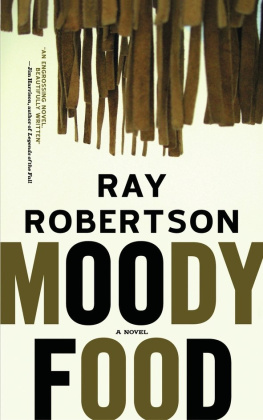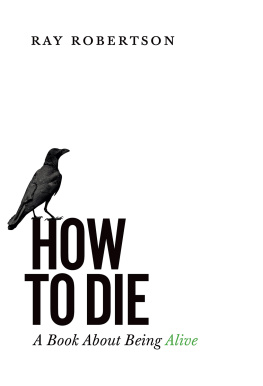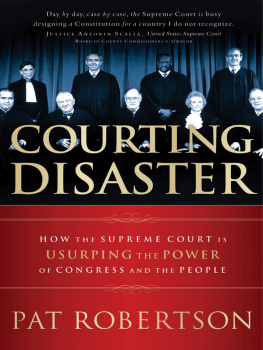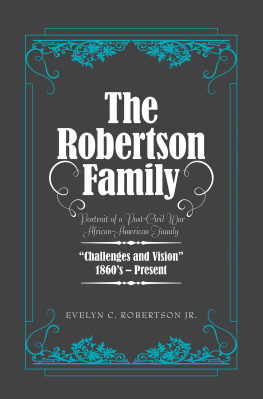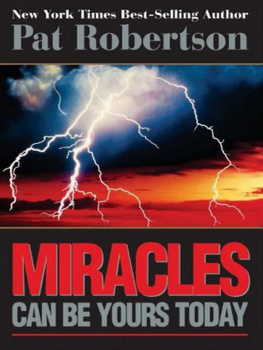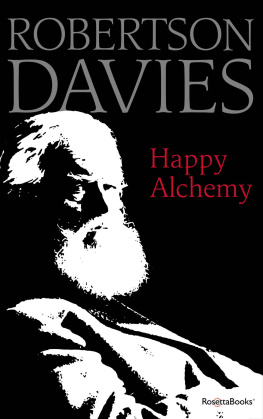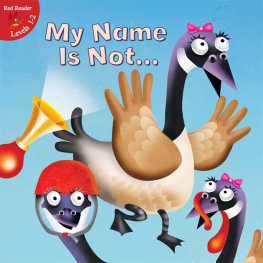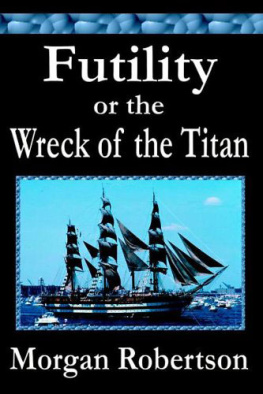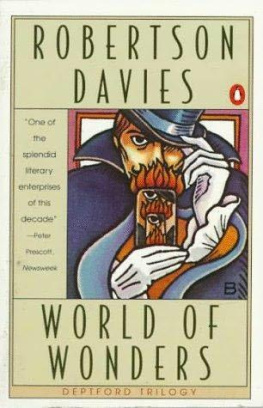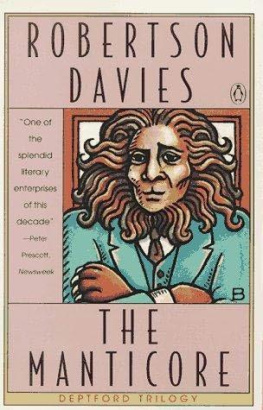Ray Robertson - Moody Food
Here you can read online Ray Robertson - Moody Food full text of the book (entire story) in english for free. Download pdf and epub, get meaning, cover and reviews about this ebook. year: 2012, publisher: Santa Fe Writers Project;Biblioasis, genre: Detective and thriller. Description of the work, (preface) as well as reviews are available. Best literature library LitArk.com created for fans of good reading and offers a wide selection of genres:
Romance novel
Science fiction
Adventure
Detective
Science
History
Home and family
Prose
Art
Politics
Computer
Non-fiction
Religion
Business
Children
Humor
Choose a favorite category and find really read worthwhile books. Enjoy immersion in the world of imagination, feel the emotions of the characters or learn something new for yourself, make an fascinating discovery.
- Book:Moody Food
- Author:
- Publisher:Santa Fe Writers Project;Biblioasis
- Genre:
- Year:2012
- Rating:5 / 5
- Favourites:Add to favourites
- Your mark:
- 100
- 1
- 2
- 3
- 4
- 5
Moody Food: summary, description and annotation
We offer to read an annotation, description, summary or preface (depends on what the author of the book "Moody Food" wrote himself). If you haven't found the necessary information about the book — write in the comments, we will try to find it.
Moody Food — read online for free the complete book (whole text) full work
Below is the text of the book, divided by pages. System saving the place of the last page read, allows you to conveniently read the book "Moody Food" online for free, without having to search again every time where you left off. Put a bookmark, and you can go to the page where you finished reading at any time.
Font size:
Interval:
Bookmark:
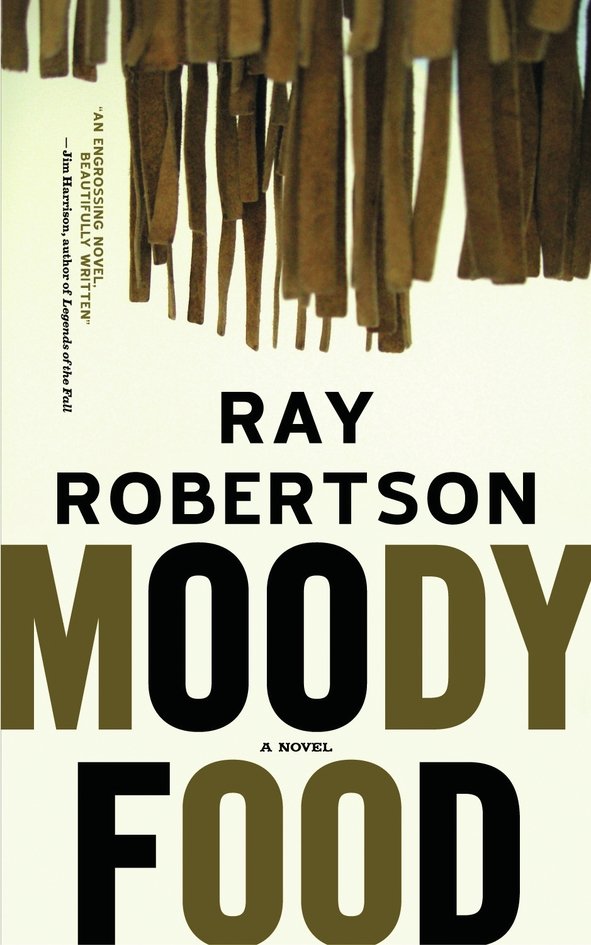
For debts past and present: Mark Boyd, Richard Currey, Lesley Grant, Tom Grimes, Nicholas Jennings, Andrew Johnson, Albert Moritz, Tom Noyes, Brad Smith, Miles Wilson, Nicole Winstanley, the Ontario Arts Council, and the Toronto Arts Council. The music of Gram Parsons was an inspiration in the writing of this book.
This is a work of fiction, and therefore of truth. Certain facts have been modified toward this end.
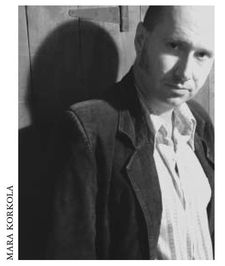
Ray Robertson graduated from the University of Toronto with High Distinction with a B.A. in philosophy and later gained an M.F.A. in creative writing from Southwest Texas State University.
He is the author of the novels Home Movies, Heroes, Moody Food, and Gently Down the Stream, and a collection of non-fiction, Mental Hygiene: Essays on Writers and Writing.
He is a contributing book reviewer to the Toronto Globe and Mail, appears regularly on TVOs Imprint and CBCs Talking Books, and teaches creative writing and literature at the University of Toronto.
I MET THOMAS GRAHAM in a bank. He was withdrawing, I was depositing.
Fall hadnt managed to elbow out of its way yet all the humidity and baking haze of September lingering summer, but Id decided to brave heatstroke anyway and broken out my buckskin jacket and slid into the friendly snug of my favourite pair of Levis. Impossible, Ive always maintained, to be the best you can be when youre not wearing pants. Maybe this is northern prejudice, or maybe Im just unnaturally sensitive about my legs. Anyway, there I was in my jacket and jeans.
And there was Thomas. In white cowboy boots and a red silk shirt with a little silver cross peeking out underneath, all topped off with a white jacket covered with a green sequined pot plant, a couple of sparkling acid cubes, and a pair of womans breasts. The jacket glowed, I swear, and Id had nothing stronger that morning than a cup of coffee. He was also the only other guy in the bank in blue jeans and with hair hanging down past his collar.
Theyd given him some kind of form to get started on while he waited in line, and he was squinting and grinning at the thing like it was written in a language he couldnt quite understand but for some reason was getting quite a kick out of anyway. Probably high, I thought. He looked up at me from the piece of paper and blew a few brown strands of hair out of his eyes.
Now that, sir, is one fine article of clothing, he said, lifting a long thin finger, pointing at my fringed jacket.
It took me a second to recover from the jolt of his southern accent. Theres a place over near Kensington Market, I said. Good stuff. Cheap, too.
Much obliged, he said. Using the pen hed been given by the bank, he scribbled down what Id just told him on the back ofhis hand. Information recorded, Thomas Graham, he said, offering his hand.
Bill Hansen.
Pleased to meet you, Bill.
A blue-haired teller signalled that it was Thomass turn at the counter. Thomas gave me a wink and loped right up. Afternoon, maam, he said.
Later, after counting out my $23.50 monthy loan payment and signing my receipt, I noticed Thomas with the teller and some obviously important higher-up at the bankhe had to be important: he was balding and wearing an expensive suitjoking and laughing like old friends. At one point the man in the suit actually clasped Thomas by the shoulder to give him a paternal squeeze. My own teller sourly tore off her part of the carbon receipt and didnt thank me for being part of the Royal Bank family.
I had to walk right past him to escape the banks partitioned maze, and Thomas turned away from the two behind the counter and put a hand on my arm. Hey, Buckskin Bill, he said, Uncle Owsley says thanks for the tip. He stuck out his hand. See you around?
Sure, I said.
I smiled, shook his hand, and didnt open my fist until I was well down Avenue Road.
When I did: two tabs of Owsley acid. Everyone who prided himself on being in the know knew about Owsley Stanley, the mad chemist of San Franciscos Haight-Ashbury. But here I was actually holding a couple of his legendary powder kegs.
Wont Christine be blown away? I thought. And wait until I tell her about the guy who gave them to me.
OKAY, JUST A LITTLE background music: Toronto, 1965 in particular.
For anyone starting to let his hair grow long and wanting to hear some good music and maybe even check out some of that free-love action youd read about going down in places like California, that would basically mean Yorkville, just north of Bloor Street. No more than three blocks in all, Yorkville was our very own city within a city, every street, alley, and low-rent hippie-converted building bursting with the sounds of loud music and the sweet smell of incense and overflowing with like-minded friendly, freaky faces. There was the Inn on the Parking Lot, the Riverboat, the Mynah Bird, the Penny Farthingcoffee shops and folk clubs, basicallywhere you could listen to Joni Mitchell and Ian and Sylvia and a million others no one has ever heard of since. Everyone drank lots of coffee and smoked plenty of cigarettes and you could play chess outside if the weather was nice and there was pot if you wanted it and all the girls, it seemed, were eighteen years old and tall and thin with the kindest eyes and long dark hair and none of them wore bras even if there really wasnt all that much love going on, free or otherwise.
But maybe that was just me. As a University of Toronto second-year dropout of no fixed major working part-time at a second-hand bookstore with no guitar-strumming ability of my own, I wasnt on anybodys love-to-love-you-baby list. At least not until Christine showed up one day at Making Waves.
The Making Waves Bookstore wasnt much more than the entire first floor of a paint-peeling Victorian house near the corner of Brunswick and Harbord crammed to the walls with the owner, Kelorn Simpsons, own book collection, most of it accumulated over twenty years of academic gypsydom. Kelorn was a fiftysomething psychedelicized Ph.D. in English literature witha framed degree from Oxford and dual portraits of Virginia Woolf and Timothy Leary hanging over the front counter to prove it. She was also near-messianic in her need to educate, physically and otherwise, the young female undergraduates who would drift into the bookstore from the university just a few blocks away, as well as reluctant as hell to sell any of her books. Which is how I started working for her in the first place.
After she saw how disappointed I was when she barely even looked at the cardboard box I brought by full of an entire semesters worth of practically new books, and then how pissed off I became when she wouldnt sell me her City Lights Pocket Book copy of Howl (a cute girl in black leotards with jet-black hair and no makeup in my Modern American Poetry class told me to read it when Id asked her out to a Varsity Blues hockey game; she also declined my invitation to the hockey game), Kelorn made me take off my coat and gloves, poured me a cup of mint tea, asked why I needed money so badly that I wanted to sell all my books, and why I wanted to read Allen Ginsberg.
After I told her about the cute girl with the jet-black hair and how Id dropped out of U of T a few months before and how the bank was calling in my loan and how Id have to move back in with my parents in Etobicoke soon if I didnt get a job, Kelorn asked me if I wanted to work at the bookstore.
Font size:
Interval:
Bookmark:
Similar books «Moody Food»
Look at similar books to Moody Food. We have selected literature similar in name and meaning in the hope of providing readers with more options to find new, interesting, not yet read works.
Discussion, reviews of the book Moody Food and just readers' own opinions. Leave your comments, write what you think about the work, its meaning or the main characters. Specify what exactly you liked and what you didn't like, and why you think so.

